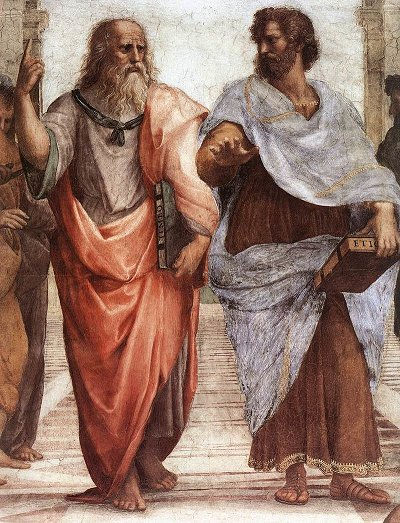Olympiodorus Younger: the Last Neoplatonist
- Sylvia Rose

- Jul 21, 2024
- 4 min read
Updated: Aug 26, 2024
Olympiodorus the Younger, a prominent figure in late antiquity, is known as the last of the Neoplatonist pagans in Alexandria, Egypt. On the sunny Mediterranean, the city has a colorful history as a diverse center of knowledge. Then in 30 BCE, the Romans arrive.

Olympiodorus (c. 500 to 565 AD) lives in a period marked by significant shifts in philosophical thought and cultural dynamics. After several centuries the allure of Alexandria has faded. It's been a slow slide.
By 200 BCE, Alexandria is a city of vibrant academic thought and cosmopolitan philosophy. A meeting point of three continents, Alexandria is the world's largest city, an intersection of Eastern religions and Western philosophical beliefs.

From left to right, the Muses are: Polyhymnia (sacred hymns), Euterpe (lyric poetry), Thalia (comedy), Melpomene (tragedy), Erato (love poetry), Minerva (goddess of wisdom), Calliope (epic poetry), Terpsichore (dance and choral song), Urania (astronomy), and Clio (history).
In 145 BCE the expulsion of intellectuals from Alexandria during the reign of Ptolemy VIII Physcon marks the beginning of the end for Alexandria's Great Library. The library is among the main reasons of Alexandria's high scholastic reputation.

Then the Great Library, once an attraction for leading academics, declines in status and reputation. It's destroyed more than once, and the Romans are stingy about supporting re-builds and inventory. The coastal jewel of Egypt loses its shine.
Olympiodorus holds the chair of philosophy in Alexandria. Manuscripts call him the philosopher of Alexandria. He sees himself as intellectual heir to Ammonius, his teacher. Olympiodorus calls Ammonius “the great philosopher”, in one case “our philosopher”.

Neoplatonism
With Hermeticism and Gnosticism gaining prominence, philosophers strive to incorporate both Hebrew and Christian thought into the spheres of intellectual evolution. Neoplatonism forms as a reaction to Christianity.
A period of philosophy based on works of Plato, Neoplatonism begins with Plotinus (204-270 AD). It officially ends with closing of the Platonic Academy in Athens by Emperor Justinian in 529 AD.

This brand of theology, often described as mystical, develops outside Academic Platonism.
Officially or not, Olympiodorus is famous for continuing the teachings of Plato in Alexandria even after closure of the Platonic Academy in Athens.
In Neoplatonism the pinnacle of existence is represented by the One or the Good, as the origin of all things. It emanates reason, the nous, which holds an endless reserve of ideas, a reflection of its own essence.

The world-soul, a replica of the nous, is enveloped within it, just as the nous resides within the One, and, by imbuing matter in itself nonexistent, constitutes bodies whose existence is contained in the world-soul. Nature therefore is a whole, endowed with life and soul.
Soul, being chained to matter, longs to escape from the bondage of the body and return to its original source. In virtue and philosophical thought it has power to elevate itself above reason into ecstasy, where it can behold, or ascend to, the primary Being reason cannot know.

According to the philosophy of Neoplatonism, unifying with the Good, or the One is the true function of human beings.
Olympiodorus commits to preserving the teachings of Plato in the face of shifting cultural and religious tides. His legacy as the last Neoplatonist in Alexandria is the vibrant intellectual heritage of the ancient city and the enduring significance of philosophical inquiry.

The Alchemy Mystery
The discussion surrounding the commentary on Aristotle’s Meteorology, including the so-called “chemical treatise” as its fourth book, raises questions about the potential connection between the Neoplatonist Olympiodorus and an individual of the same name in alchemical traditions.
Existing manuscripts of an alchemical work claiming to be a commentary on Zosimus’ Kat’ energeian (On Activity) attribute the authorship to “Olympiodorus, the Alexandrian philosopher”.

This alchemical works initially delves into an explanation of a passage by Zosimus of Panopolis, but then transition into a didactic letter addressed to an unnamed fellow alchemist (referred to as ‘friend of the Muses’ at one point).
It provides guidance on how to unite fragmented pieces of gold, purify metals, underscores the importance of ‘divine water,’ (made of sulfur and quicklime), and more. The texts are now considered forgeries.

Olympiodorus is a versatile man, a trait he needs in the tumult of the Alexandrian social, political and religious upheavals. Officially he teaches works relevant to the authoritative curriculum and makes no waves. When he dies, after 565, his students continue his work.
Non-Fiction Books:
Fiction Books:
READ: Cult of the Fire God - Bronze Age Quest Adventure
READ: Lora Ley Adventures - Germanic Mythology Fiction Series
READ: Reiker For Hire - Victorian Detective Murder Mysteries


